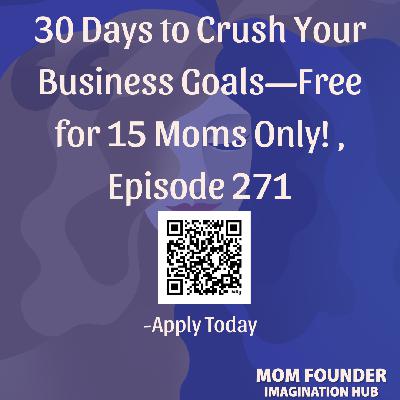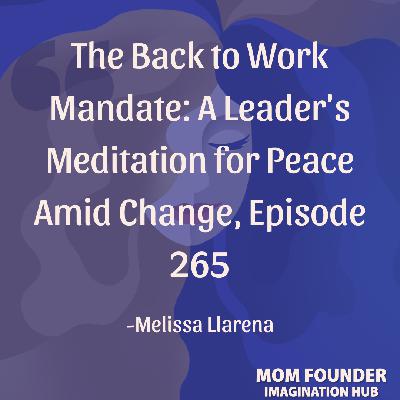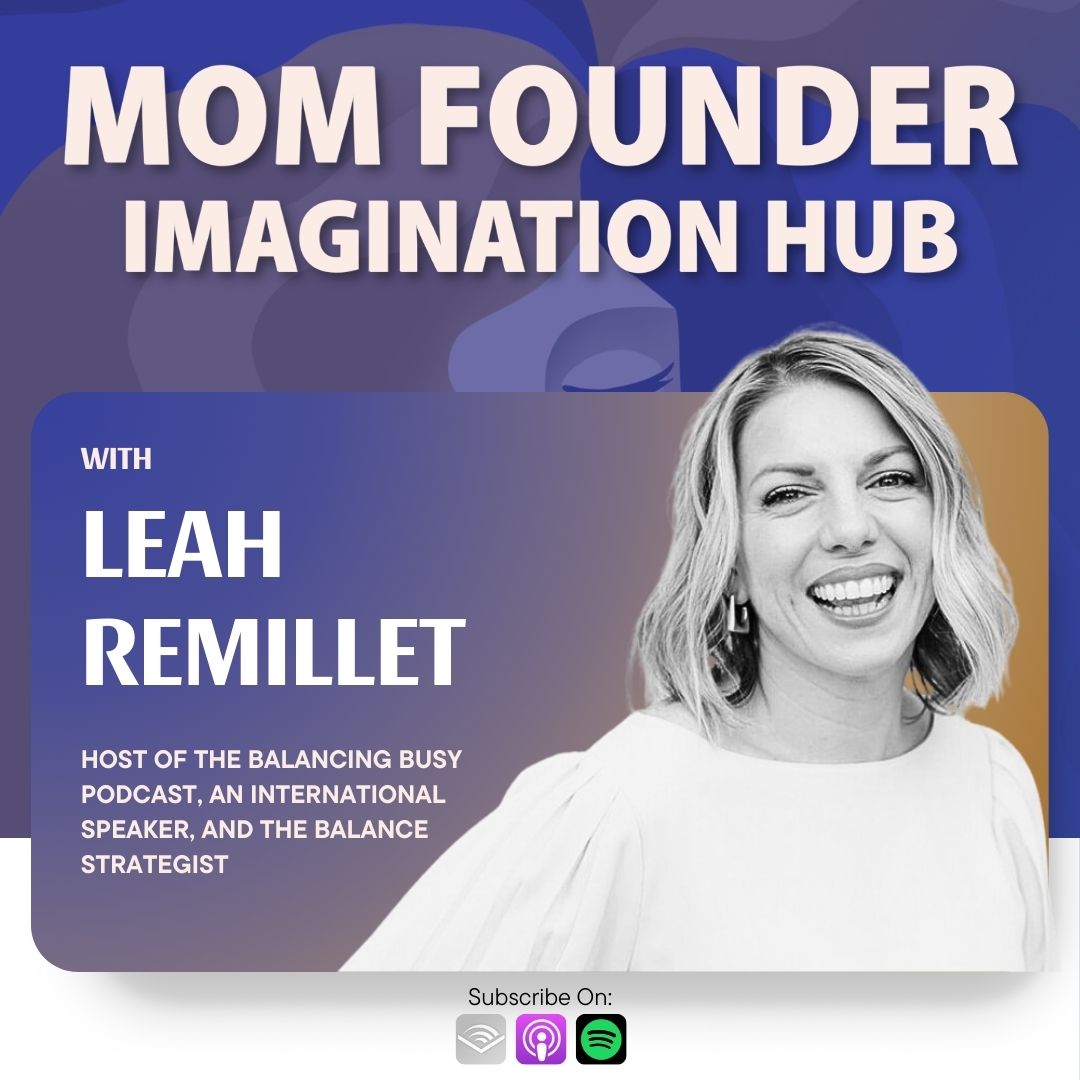268: Co-existing with Work + Family Stress: A Four Noble Truths Approach
Description
Let's find the good in experiencing stress so that you don't shortchange yourself out of its ability to instill inner confidence in your capabilities. We are focused on experiences such as birthing a baby, building a business, or navigating a everchanging workplace.
Just because someone else fell apart in any of those situations, it does not mean that you will too. It's unique to you, yet worth uncovering, because when you get to the other side of a stressful situation, if you embody at least one learning or lesson, then you will have increased your capacity to handle more stressful situations.
This comes in handy, as life often hands us stress at a pretty hot and heavy pace. In this article, we'll interweave the four noble truths along with personal stories that showcase the value of embracing stress rather than running away from it.
There have been so many occasions when I was told not to put so much pressure on myself, and it was out of those circumstances, where I didn't let their thinking impact mine, that I can now tell my greatest stories of defiance and delivery. A memorable such moment was during my first semester of law school. My mom told me this: 'Watch out, Melissa, and try not to experience too much stress.' She was giving me a fair warning based on her own sensitivities to stress. My mom has manic depression. A person with manic depression can be sent into an episode or spell by stress. While that guidance came from her experiences, it also came along with her tender concern for my mental health. My mental health, on the other hand, has proven sturdy, in great part because I've had ample opportunities to practice the art of experiencing stress.
Law school wasn't a moment of redemption, but it was the time I realized my limit. I'm glad I didn't listen to my mom, because then I wouldn't have discovered my kryptonite. We need to know our kryptonite and how to overcome it. Somehow, it was that combination of overwhelming debt and basing my self-worth on school grades that almost broke me. I got through that time mentally unscathed, thankfully, but intuitively, I knew it was close. There's a benefit to knowing how far you can go. That experience gave me the courage to finally pursue my dream career in advertising. Taking a pay cut didn't seem so bad when the alternative was six-figure debt and no income.
The trick is to always stay beneath that line. My self-publishing experience with Fertile Imagination pushed me to that limit. I had gotten my edited copy of my manuscript extremely late, and to compensate for that delay, I sat in my chair for twelve hours straight. The pressure I put on myself to finish the book was enormous. Around the twelfth hour, I felt a crack in my neck, which turned into a year of pain, physical therapy, and an MRI. Ever gotten an MRI? I've been through a lot, but somehow my anxiety was insane during that MRI, and my relationship with God has never been closer. It was like a church service in that cylinder. Yet, this was another opportunity to practice coexisting with stress. I don't regret that experience, and I know I learned from it. The other side of that stressful moment was completing my book and focusing on my physical health, a goal I'd been writing about for decades. Yet, somehow, I had to crash physically to finally pursue it.
In these two cases, I needed to experience these greater stresses to build the confidence and conviction necessary to believe I could endure the kind of stress it takes to go after what I've always wanted. What if the same is true for you? What if, rather than avoid stress, you walked right into it with a different perspective? What if you need that vote of confidence—knowing you can handle a ton of stress—to get the kind of laser focus necessary to finally jump into your greatest personal or professional adventure? What if you need to have something to say: 'Well, if I did that and didn't die, then I might as well go for this'? I want to share a new way to think about stress because it's the reality of being human. As a meditation practitioner, I thought I'd enlist the help of the four noble truths to help us see the profundity in otherwise stressful experiences. My meditation offerings are secular, yet I do think ancient wisdom has its place in stress management. It gives me comfort to know that my experiencing stress is not novel; it's normal and expected. So, let's turn to commonly held beliefs that we can anchor this conversation in—the four noble truths
Understanding the Four Noble Truths
The Four Noble Truths are fundamental to Buddhism and describe the nature of reality and the path to liberation. They are:
1. Dukkha: This is often translated as "suffering," but more accurately encompasses unsatisfactoriness, frustration, and the inherent impermanence of all things.
2. Samudaya: The origin or cause of dukkha, which is identified as craving, attachment, and aversion.
3. Nirodha: The cessation of dukkha, which is achieved through the elimination of craving and attachment.
4. Magga: The path leading to the cessation of dukkha, known as the Noble Eightfold Path, which encompasses right understanding, right thought, right speech, right action, right livelihood, right effort, right mindfulness, and right concentration. 1
The Inescapability of Stress in Modern Life
You don't need to be a Buddhist to believe that being human means experiencing suffering. Just look around corporate America—you can see and feel it everywhere. According to Ohsa.gov, 83% of US workers suffer from work-related stress. You can be stressed about having, keeping, leaving, or getting a job. The sound of a ping can spike your cortisol levels. It doesn't take much to suffer these days. We experience a constant, low-grade level of stress or anxiety, and our baseline sensitivity to stress is very low. This comparison comes from the constant barrage of information we consume daily, which contributes to "sympathy stress," as well as the fact that many of us are openly struggling. This is why it's necessary to find a way to coexist with stress; it's inescapable.
A Yoga Analogy for Managing Pain
In my pre-natal yoga class with my firstborn, the teacher had us sit on our bent toes. Her rationale was to have us experience physical pain and, instead of running away, breathe through the stretch. Was this comparable to birthing any of my kids? Heck no! It was a way to introduce the idea of feeling pain and remaining still within that feeling. The teacher's approach was to increase our tolerance for the inevitable pain of childbirth. The pain of childbirth is inescapable. This toe stretch gave me a chance to imagine being with inescapable pain in a situation where I could escape. It's this intentional decision not to escape an escapable pain that builds confidence. You have the chance to escape discomfort, yet you wrangle your fears and push forward anyway. There's immense power in those moments. This is where your practice comes in, and how meditation can help you coexist in an empowered state amidst life's struggles. You can pause and breathe through life's emotional ups and downs instead of panicking and stopping the train.
The Second Noble Truth: Understanding Craving, Attachment, and Aversion
The second noble truth is Samudaya. It's the craving, attachment, or aversion to the feeling of stress. It's always a practice for me. As a business owner, it's easy to crave a consistent income or feel attached to maintaining a certain reputation. Aversions are real for us, too, such as my aversion to tech issues. Yet, my perpetual thoughts about these situations have gotten in my way. These situations are tough enough. By experiencing this second noble truth, I'm not doing myself any favors. This is why equanimity helps; it helps us focus on what's needed in the moment. I'll share an example in a bit. But first, let's turn this to you.
The Fear of Obsolescence in the Age of AI
Let's talk about craving for career permanence. Whether you are an entrepreneur or employee, this idea translates. The fear of becoming obsolete (FOBO) is rising among workers as AI advancements accelerate. A Gallup poll found that 22% of U.S. workers are concerned about their jobs becoming obsolete due to technology, and that figure is up from 2022. Imagine how freelance copywriters or coaches feel these days. Some feel like they are being promptly put out of business. The threat is real; however, thinking about the threat is stealing the time necessary to uplevel your skills or take actions to support your business. You are adding a layer of unnecessary suffering, draining your finite energy. AI is here, and so are you. How can you coexist with AI? This reminds me of those required college courses I didn't like. They were inescapable and boring. However, it was me who made them feel brutal when I procrastinated reading those ancient texts. Fast forward to today, and I can say that I had the same thoughts while completing some requirements for my meditation certification program.
Finding Peace in Medit












